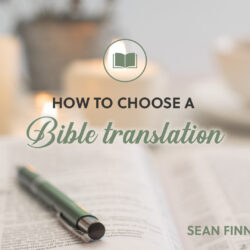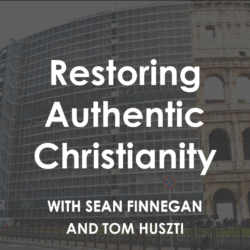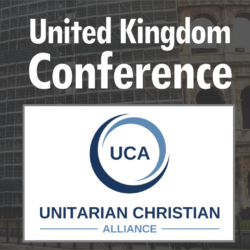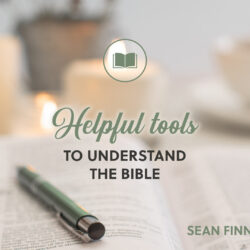In our last episode, I recommended some mainstream Christian Bible translations, but I would remiss if I didn’t also review some important unitarian Bible translations. Although often overlooked, these versions are important because they have the opposite bias when it comes to passages commonly offered as proof texts for the Trinity. Also, I asked Dr. Jerry Wierwille to join me today, since he is Bible translator, currently working on a unitarian bible translation. In today’s episode we’ll review the following:
- Emphatic Diaglott by Benjamin Wilson (1864)
- New European Version by Duncan Heaster (2013)
- New World Translation by Jehovah’s Witnesses (2013)
- Kingdom of God Version by Raymond Faircloth (2018)
- The One God, the Father, One Man Messiah Translation by Anthony Buzzard (2020)
- The Revised English Version by Spirit and Truth (ongoing)
In this episode, we’ll offer some background on each of these versions and in our next episode we’ll compare them and see how they handle a number of interesting texts.
—— Links ——
- Check out these other episodes with Jerry Wierwille
- Episodes mentioned in this podcast: Evaluating the Message Bible and the Passion Translation, Evaluating the King James Version, Reconstructing the New Testament, and New Testament Textual Criticism
- If you’d like to support Restitutio, you can donate here.
- Intro music: Good Vibes by MBB Attribution-ShareAlike 3.0 Unported (CC BY-SA 3.0) Free Download / Stream: Music promoted by Audio Library








excelente presentation.
Pastor Sean, what translation does your dad, Vince, use?
Sometimes i see he use NT translation with Yahweh Name.
thank you Dr. Jerry too.
Hey Julio,
Thanks for listening. My dad generally uses the NASB. He substitutes in God’s name when he reads aloud.
Thanks for the review. Sean, as you mentioned, the Greek text I used was not Westcott and Hort of 1881, but the Greek NT edited by Kurt Aland, Bruce Metzger et al, 1983 (third corrected edition).
Have you heard of the MLV – Modern Literal Version? Their translation philosophy/method sounds good, but it would be cool to get an opinion from a pro. I have used the 2017 update version for a few years. It looks like there’s only a few places where they choose to go with a more traditional translation that Unitarians wouldn’t like. They say multiple times in the notes that their main goal is to get rid of any bias and that “theologians will just have to adjust!”
I really enjoyed the episode – and I’m looking forward to the next one! I have access to all the mentioned Unitarian translations.
Comment for Jerry :
Joseph Rotherham was consistently using the Divine name ‘Yahweh’ for all occurrences of the Tetragrammaton in his Old Testament translation way back in 1902! This practice was also followed in 1966 by the Jerusalem Bible, and the ‘New Jerusalem Bible’ (1985).
Comment for Sean:
The interlinear Greek-English NWT ( N.T.) uses the Westcott and Hort Greek text. This is still probably the underlying Greek text of the 2013 NWT (N.T.) edition of New Testament.
General Comments :
(1). The interesting ‘Emphatic Diaglott’ English translation can be accessed at :
http://www.studybible.info
(2).If you’ve got any complicated questions in New Testament Greek – such as ‘What are the legitimate interpretative options for the use of ‘heuramenos’ [‘having obtained’] the Greek middle voice, at Hebrews 9:12 ?’ – then consult the extremely helpful, amiable and erudite Dr. John Bechtle at :
http://www.ezraproject.com/john-bechtle
Contrary to what Jerry stated in the podcast, The New European Version by Duncan Heaster is not a product of “the Christadelphian Church”. Jerry stated, “This version is put together by the Christadelphian Church”. This statement is simply flat-out wrong. First, a minor issue… The average Christadelphian would cringe to hear the word “church” used in association with their denomination. The Christadelphians have no central headquarters or clergy. They are a lay organization of totally independent fellowships bound together only by common doctrines. Now, with that minor point aside, the NEV is a project of Duncan Heaster and/or his ministry alone. You can easily verify this to be true by visiting the official n-e-v.info web site where you will see that Duncan has put the (c) Copyright symbol next to links to the NEV text and commentaries. Yes, Duncan identifies himself as a Christadelphian, but that doesn’t make his personal project (the NEV) a product of “the Christadelphian Church” any more than the Message Bible is a product of the Presbyterian Church, USA, just because Eugene Peterson, its author, was an American Presbyterian. Christadelphians do not endorse or use the NEV any more than they endorse any other Bible translation. In fact, very few Christadelphians are even aware of the NEV’s existence, let alone use this remediation of the KJV into modern English, which is what the NEV really is. I suspect Jerry got his information from the http://christadelphia.net/nev.htm web page, which is the top search result if you Google “New European Version.” This web site states, “Christadelphians have produced the New European Version of the Bible…” If this is where Jerry got his information, then what Jerry failed to realize is that this website is actually owned and run by Duncan Heaster. Unfortunately, Mr. Heaster’s statement is misleading. Duncan is inflating himself and trying to make it look like his personal project has the support of a larger, worldwide entity. It simply does not.
Dear Peter;
1. Some Christadelphian groups in the ‘Central’ Christadelphian and the Australian ‘Unity’ Christadelphian denominations do call themselves ‘Churches’.
2. Your rather uncharitable attitude towards Duncan Heaster is not replicated by many other Christadelphians.
3. As Christadelphians often give non-biblical meanings to various New Testament words such as ‘ ho satanas’ and ‘ho diabolos’ (in the interests of their own dogmas), would it not be very apposite for Christadelphians to produce their own Bible ” Translation” ? .
John,
1. Sure, a small minority of Christadelphians may use the term “church,” but my posting was based upon over 100 years of historical preference of the term “ecclesia” over “church” by the majority of Christadelphians. I specifically wrote “The AVERAGE Christadelphian would cringe to hear the word “church” used in association with their denomination.” I didn’t state “all Christadelphians…”
2. Duncan owns the web site in question where the statement can be found that “Christadelphians have produced the NEV…” It is therefore likely that he wrote the line in question, which is misleading, for it has led Jerry W. to conclude that the NEV is a product of the “Christadelphian Church.” But not to sound uncharitable, I will retract the word “inflate” and reword my observation thusly: “Unfortunately, the statement at Mr. Heaster’s website is misleading. His website gives one the impression that his personal project has the support of a larger, worldwide entity. It simply does not.” My apologies for any offense given.
3. The answer to your hypothetical is “no, it would not be appropriate.” The reason goes back to my first posting where I wrote ” The Christadelphians have no central headquarters or clergy. They are a lay organization of totally independent fellowships bound together only by common doctrines.” Since there is no “president” or “chief apostle” or headquarters for the Christadelphians, there simply cannot be an official “Christadelphian” Bible translation. What you can have, however, are personal projects such as Duncan Heaster’s NEV. Christadelphians would greatly shy away from accepting one translation over another for many reasons, among them would be the general understanding among orthodoxy that one of the signs of a cult is that they have their own Bible translation.
Hi, Peter;
Thanks for your comments. All points taken!
However : (1.) You talk as if ‘Christadelphianism’ is one big, homogeneous body. There are many different exclusive Christadelphian groups, and even within the larger bodies (‘Central’ and the Australian ‘Unity’ ‘Fellowships), there is a wide variety of personal beliefs and attitudes that would not be considered (by ‘right-wing’, traditionalist Christadelphians) as orthodox.
(2.) Since the end of the nineteenth century, our knowledge of the biblical languages and biblical cultures has increased appreciably. Unfortunately, a lot this fine scholarship has passed the vast majority of Christadelphians by (especially as regards the usages of the Greek middle voice). A Christadelphian project to produce their own New Testament would at least, hopefully, act as an impetus for Christadelphians to objectively learn more about Jewish Koine (in the LXX), and New Testament Greek – and what it would have meant to its first century listeners.
Hi Sean/Jerry
Really enjoyed your the episodes Sean on “How we got the Bible”.
I have a question for Jerry regarding the REV in John 1:1 that has the phrase “what God was the word was”.This phrase seems clumsy english to me even if it used in the English translation, the NEB and this phrase is also ambiguous to me. I notice quite some time ago that it was changed in the REV (online) for a short time to, I believe “the word was fully expressive of God”, which I think has a clearer meaning and easier to readers like myself to understand (?? did Dustin Smith sneak this in).
Don’t get me wrong I really like reading the REV and I think it a fantastic version and this phrase is only one I struggle with, only because it is one of the sacred cows that is used by trinitarians to promote their doctrine. The NWT and the Moffet to me seem clearer. I would be very interested to know what you think Jerry and you to Sean on this point!
May God richly bless you both
Kerry from down under
Hi, Kerry;
Here’s my comment (‘A full four Australian cents worth’ !)
Background Info : My studies lead me to understand that ‘the Logos’ is a concept meaning ‘God’s Self-expressive activity’, manifested in both creation and in revelation. This ‘self-expressive manifestation of God’ became most fully revealed to us (‘incarnated’) in Jesus, God’s Son. Hence, Jesus reveals to us the most that we humans on earth can ever perceive and conceive of the one true God, Who is the ‘Father’ (John 17:3). However, God is greater than the Logos (i.e. potentially greater than that which He has so far revealed to us humans, on earth). God loves us, but God will reveal more of His loving Self to us, in the future – when we will have a greater ability to comprehend it, in ‘supernatural bodies’ – (cf. 1 Cor. 2:9; 13:12; and 15:28).
Although I am more than willing to be corrected, John 1:1 might possibly (in paraphrase) be read something along the lines of :
” In the beginning was the active Manifestation’.,
The Manifestation concerned God,
And the Manifestation was ‘God’.”
In the past, God manifested Himself to Man through supernatural Angels (cf. Exodus 3:2 ff; 23:20-21), but afterwards, supremely, in His Son, Jesus.
.
Another translation using Yahweh, rather than LORD, in the Old Testament, is the World English Bible (WEB), which is based on the 1901 ASV. The FAQ seems admirably open about translation decisions and sources to me, though it may not qualify as relying on the best scholarship available.
https://worldenglish.bible/
Thanks, David. I like the ‘listen aloud’ facility.
The best solution is the learn Greek. In college, back in 1976, when I first learned Greek, I found all the translations have BASIC Greek errors. Even if you only have a Strong’s Concordance, you can see multiple translation errors and inconsistencies with all the translations.
Thanks for this terrific podacst episode. When I was a JW, I of course only used the NWT, and I’ve always been puzzled and annoyed that there was a dearth of modern translations that kept God’s name in instead of replacing with God or Lord. I’m excited to get my copy of the REV (just ordered) and I grabbed the app. Just as a helpful resource for those who haven’t really explored translations or know the difference between equivalent and dynamic translations, I highly recommend Dr. Leland Ryken’s book “The Word of God in English.”
On another note, when I asked my theology professor, Dr. Grudem, regarding why their ESV committee opted to omitting YHWH or some translation of the tetragrammaton, which is in the Scriptures nearly 7,000 times, he just brushed me off with a comment about how the LXX uses Lord/kyrios in all instances (didn’t even address the OT).
I’m wondering what you or Jerry feel about using the name of God in the NT in all the places where the writers are quoting the OT (which had the name of God in them). I personally don’t feel the LXX is the “do all, be all” authority for translations. Appreciate you all so much!